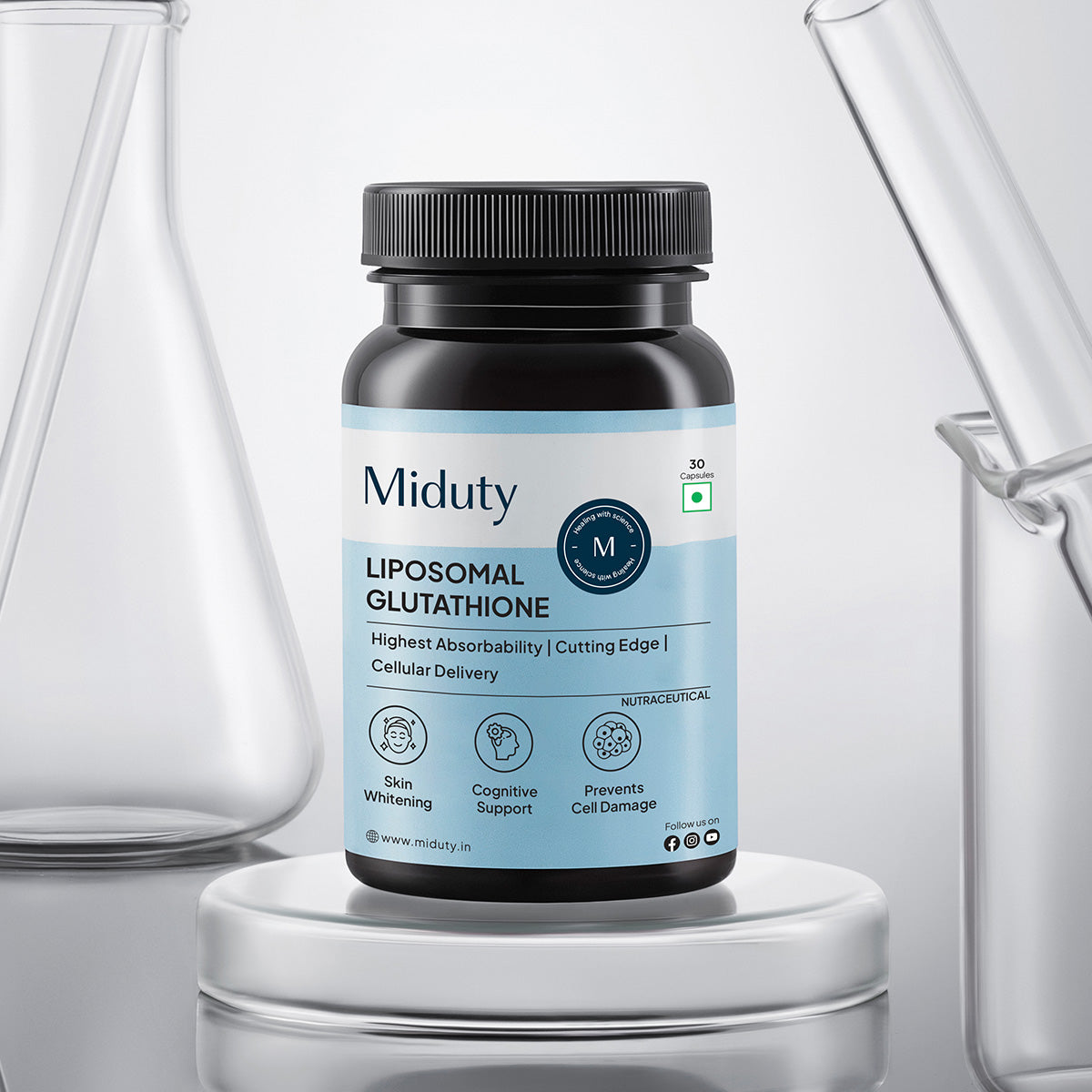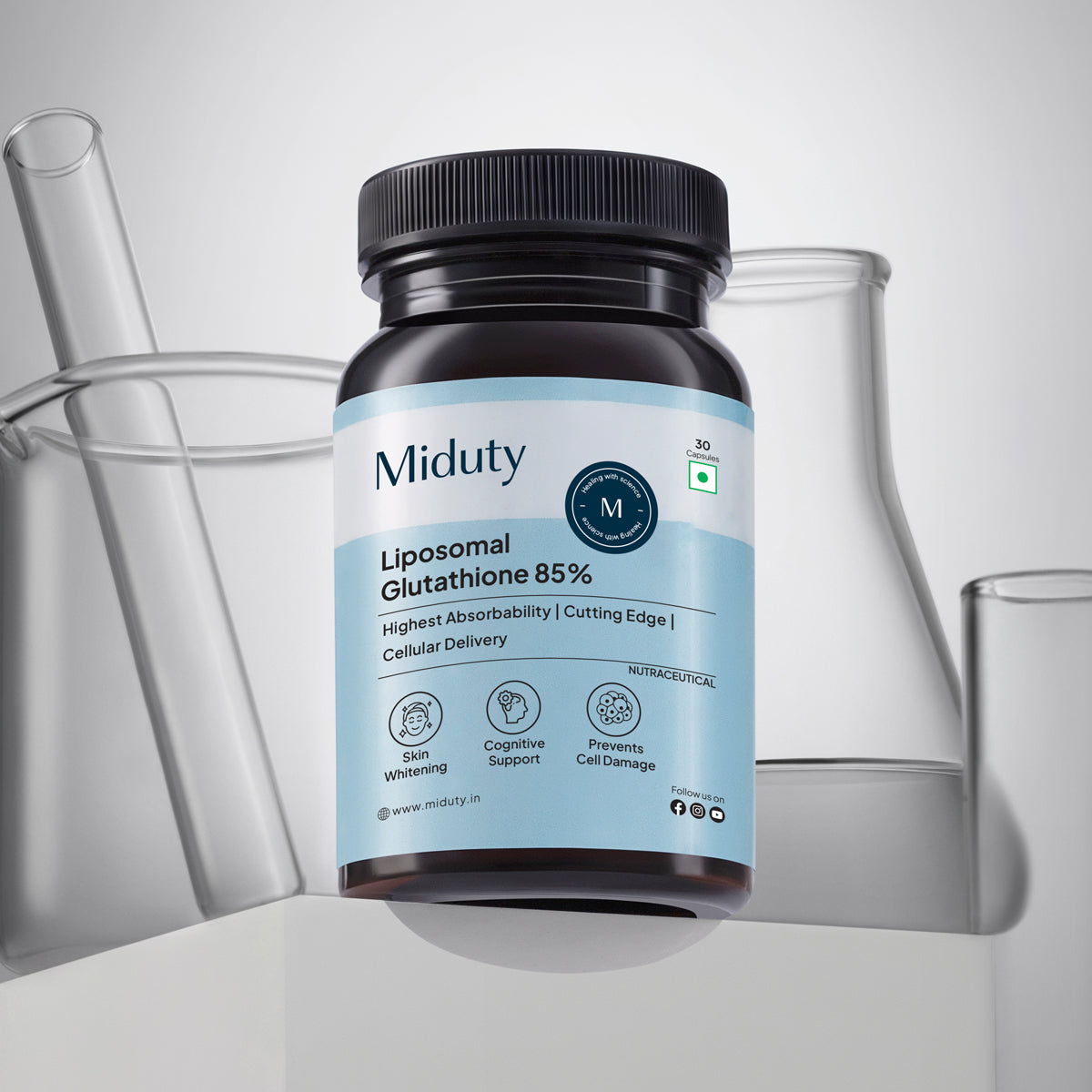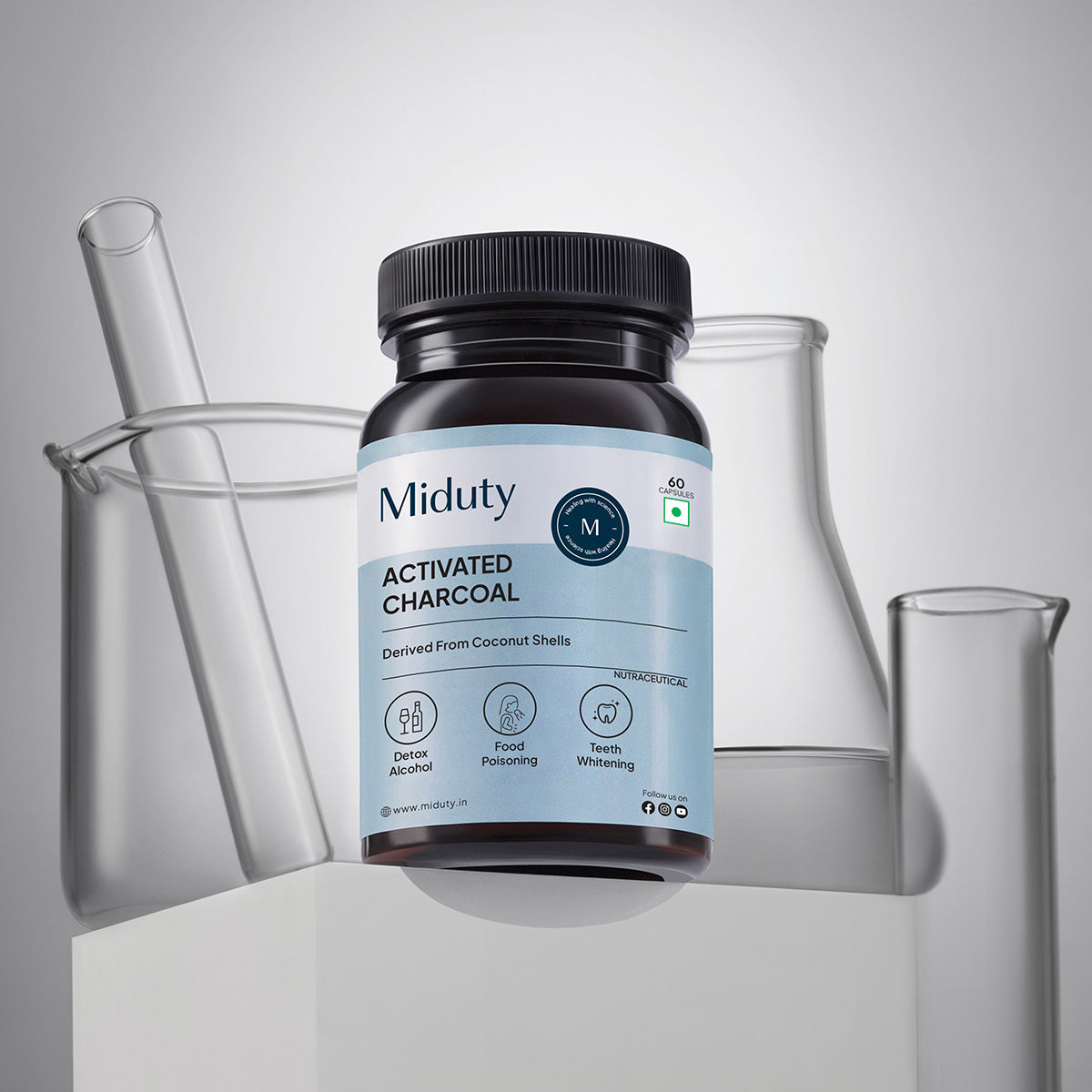
Glutathione for Hair Growth: Benefits and How to Use?
If you have ever stared in the mirror wondering why your hair looks dull, thin, or lifeless despite using every promising shampoo on the shelf, you are not alone. Many people struggle with hair concerns that go beyond what topical treatments can fix. The truth is, healthy hair starts from within. One nutrient that has been gaining attention for its remarkable effects on overall wellness, skin radiance, and now hair health is glutathione. Often called the "master antioxidant," glutathione works at the cellular level to detoxify, protect, and rejuvenate the body. When your cells function optimally, your hair can finally thrive.
This article explores how glutathione contributes to hair growth, what science says about its role, and how you can safely boost your body's glutathione levels for stronger, shinier hair.
Key Takeaways
1. Glutathione is essential for healthy hair growth. It detoxifies the body, supports liver function, and helps maintain a clean scalp environment where hair can grow stronger and healthier.
2. It protects against oxidative stress. By neutralizing free radicals, glutathione prevents damage to hair follicle cells, reducing thinning, breakage, and premature graying.
3. It promotes cellular repair and pigment production. Glutathione supports cell regeneration and melanin synthesis, helping hair stay vibrant, dense, and youthful.
4. Balanced glutathione levels enhance overall hair health. Improved circulation, hormone regulation, and nutrient absorption contribute to better hair texture and growth.
5. Diet and supplements can boost glutathione naturally. Eating antioxidant-rich foods, managing stress, getting enough sleep, and choosing well-formulated liposomal glutathione supplements help sustain optimal levels for lasting hair vitality.
What Is Glutathione?
Glutathione is a powerful antioxidant produced naturally in the liver. It is made up of three amino acids: cysteine, glutamic acid, and glycine. This tripeptide works as a defense system for your cells, neutralizing free radicals, aiding detoxification, and supporting immune health.
As we age, or when the body is exposed to stress, pollution, or poor nutrition, glutathione levels tend to decrease. This depletion can affect cellular repair and regeneration. Since hair growth is directly tied to cell activity within the scalp and follicles, a lack of glutathione can impact how well your hair grows and how vibrant it looks.
Understanding the Link Between Glutathione and Hair Growth
Glutathione plays a key role in promoting healthy hair growth by protecting cells from oxidative stress and supporting detoxification. It helps maintain a clean, nutrient-rich scalp environment, allowing hair follicles to function efficiently. By reducing inflammation and improving cellular repair, glutathione strengthens hair from the root and may even help prevent premature graying. Maintaining optimal glutathione levels through diet or supplementation can enhance overall hair health and growth.
Glutathione Benefits for Hair Growth
1. Detoxifies the Body and Scalp
Your body encounters toxins every day, from processed foods to air pollution. These toxins can build up in the bloodstream and even affect the scalp environment, leading to clogged follicles and impaired hair growth. Glutathione supports liver function, helping your body eliminate these harmful substances.
When your liver is working efficiently, the blood circulating to your scalp is cleaner and richer in nutrients. This detoxification process creates a healthier foundation for new hair to grow. A clean scalp environment also reduces dandruff, excess oil, and irritation that can weaken hair strands. [1]
2. Fights Oxidative Stress
Free radicals are unstable molecules that damage cells, including those responsible for hair growth. Oxidative stress, caused by an imbalance between free radicals and antioxidants, can lead to hair thinning, premature graying, and slower hair regeneration.
Glutathione neutralizes these free radicals before they harm your cells. By protecting hair follicle cells from oxidative stress, it helps maintain their vitality and function. Studies have shown that when antioxidant levels in the body are balanced, the hair growth cycle improves, resulting in thicker and healthier strands. [2]
3. Supports Cellular Regeneration
Each strand of hair grows from a follicle that depends on healthy cell division. If the cells in your follicles are damaged or weak, hair growth slows and breakage increases. Glutathione promotes cellular repair by maintaining the balance of oxidative and reductive reactions in the body.
This balance allows cells to regenerate more efficiently, ensuring that hair follicles stay strong. Healthier follicles mean less shedding, faster growth, and improved hair density over time.
4. Strengthens the Immune System
Autoimmune and inflammatory conditions can disrupt normal hair growth. A strong immune system helps protect hair follicles from damage caused by inflammation or infection. Glutathione is essential for immune regulation, supporting the production of white blood cells and controlling inflammatory responses.
By keeping the immune system in check, glutathione indirectly safeguards your hair follicles from unnecessary stress and damage, allowing natural hair growth cycles to continue without interruption.Beyond its direct impact on the scalp and follicles, glutathione offers several indirect benefits that can further enhance hair health.
5. Improved Circulation
Healthy circulation ensures that hair follicles receive the oxygen and nutrients they need to produce strong hair. Glutathione improves vascular health and supports red blood cell function, allowing better nutrient delivery to the scalp. [3]
6. Hormonal Balance
Hormones play a vital role in hair growth. Excessive stress or imbalance can trigger hair loss conditions like telogen effluvium or pattern baldness. Glutathione supports liver detoxification, which helps the body eliminate excess hormones such as DHT (dihydrotestosterone) that are often linked to hair thinning.
7. Better Nutrient Absorption
Even with a nutritious diet, poor absorption can limit the benefits of vitamins and minerals that your hair needs. Glutathione enhances digestive efficiency by protecting the intestinal lining and supporting healthy gut bacteria. This ensures that nutrients such as biotin, zinc, and vitamin B12 are properly absorbed and used by your body.
How to Increase Glutathione Levels?
While your body makes glutathione naturally, you can help maintain or increase its levels through diet, supplements, and lifestyle choices.
1. Eat Glutathione-Rich Foods
Foods rich in sulfur and antioxidants help stimulate glutathione production. Include items like garlic, onions, broccoli, spinach, kale, and asparagus in your meals. Avocados and tomatoes are also excellent sources.
For an extra boost, consider foods that are high in selenium, such as Brazil nuts and sunflower seeds, as selenium supports enzymes that help regenerate glutathione.
2. Supplement Wisely
Glutathione supplements are available in capsules, powders, and injections. Liposomal glutathione, which is better absorbed by the body, has become particularly popular. You can also take N-acetylcysteine (NAC), a precursor that helps your body produce more glutathione naturally.
Before starting any supplement, it is important to consult a healthcare provider to determine the right dosage and ensure it fits your individual needs.
3. Prioritize Sleep
Your body regenerates cells and produces antioxidants like glutathione while you sleep. Poor sleep habits can lower glutathione levels and increase oxidative stress. Aim for 7 to 8 hours of quality sleep each night to support both your overall health and your hair growth.
4. Manage Stress
Chronic stress is one of the biggest culprits behind depleted glutathione levels. Stress triggers the release of cortisol, which can damage hair follicles over time. Practices such as meditation, yoga, or regular exercise can reduce cortisol levels and promote antioxidant balance.
5. Limit Alcohol and Processed Foods
Alcohol and processed foods generate free radicals and deplete glutathione stores. Reducing your intake of these substances can help maintain optimal antioxidant levels. Replace them with whole foods rich in vitamins C and E, which also support glutathione activity.
Can Glutathione Reverse Hair Loss?
While glutathione supports healthy hair growth, it is not a miracle cure for all types of hair loss. Genetic factors, hormonal imbalances, and medical conditions may still require targeted treatments. However, by enhancing cellular health, improving detoxification, and reducing oxidative damage, glutathione can create the ideal internal environment for hair to grow at its best potential.
Some studies suggest that individuals who maintain balanced antioxidant levels experience slower hair thinning and improved scalp health. Combined with a healthy lifestyle and proper nutrition, glutathione can be a powerful ally for those looking to improve hair quality naturally.
How to Choose the Best Glutathione Supplement?
When choosing a glutathione supplement, prioritize absorption, purity, and formulation. Many traditional capsules lose potency during digestion, reducing their effectiveness. Liposomal glutathione supplements use a next-generation delivery system that encases glutathione in microscopic lipid spheres, improving cellular uptake and offering up to eight times higher absorption compared to regular forms. Look for supplements that are clinically tested, free from artificial additives, and made with high-quality ingredients. Choosing a well-formulated, easily absorbed supplement helps your body maintain optimal glutathione levels, supporting better detoxification, improved cellular health, and stronger, more vibrant hair growth from within.
Final Thoughts
Hair health reflects what is happening inside your body. While topical treatments and oils can help, true hair growth starts at the cellular level. Glutathione's ability to detoxify, regenerate, and protect your body from oxidative stress makes it an essential nutrient for strong, beautiful hair.
By nourishing your body with the right foods, managing stress, and supporting glutathione production naturally or through supplements, you can promote healthier hair growth and restore your scalp's vitality. Whether your goal is to add shine, strengthen strands, or slow down graying, glutathione offers a science-backed path to achieving hair that truly looks and feels alive.
FAQ's on Glutathione for Hair Growth -
Q1 - Can glutathione regrow hair?
Glutathione doesn't directly regrow hair but supports overall hair health by protecting follicles from oxidative damage. It helps maintain a healthy scalp and may slow premature graying. For hair loss, it's best to consult a dermatologist and combine medical treatments like minoxidil or PRP therapy with a balanced diet and stress control.
Q2 - Does glutathione lighten hair?
No, glutathione does not lighten hair. It is mainly known for its skin-brightening effects and strong antioxidant properties that protect cells from oxidative stress. There's no evidence that it causes hair to turn white; instead, by reducing oxidative damage, glutathione may actually help delay premature graying and support healthier hair.
Q3 - Does glutathione turn hair grey?
No, glutathione does not make hair grey; it may actually help prevent it. As a powerful antioxidant, glutathione protects cells from oxidative stress, which can harm the melanocytes responsible for hair pigment. By supporting these pigment-producing cells, glutathione helps maintain melanin levels and may slow down the natural graying process.
Q4 - Do glutathione whiten hair?
Glutathione is not proven to whiten hair, though some believe it might slightly lighten hair color by affecting melanin production. At the same time, it protects against oxidative stress, which helps prevent premature graying and supports overall hair health. Its effect on hair color is complex, and there is no clear scientific evidence that glutathione can make hair turn white.
Q5 - What are the side effects of glutathione on hair?
While glutathione is an antioxidant that may help protect hair, potential side effects on hair include greying, hair thinning or loss, and changes in texture. Greying can occur because glutathione affects melanin production, while high doses or imbalances may lead to hair thinning, and some people report changes in texture like increased softness. Other common side effects, unrelated to hair, can include nausea, diarrhea, and allergic reactions.
References












